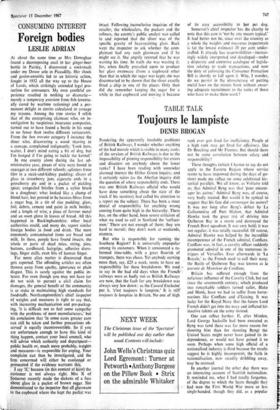Touj ours le lampiste
TABLE TALK
DENIS BROGAN
Pondering the apparently insoluble problems of British Railways, I wonder whether anything of the bad morale which is visible in many ranks of the services of British Railways is due to the impossibility of pinning responsibility for errors and disasters on anybody above the lower ranks? I have been reading with somewhat alarmed interest the Hither Green inquiry, and it certainly raises (as the Aberfan inquiry did) the question of where responsibility ends. There was one British Railways official who would have done something about the state of the track if his secretary had called his attention to a report on the subject. There has been a stout denial of responsibility for anything wrong coming from quite high in the hierarchy. There has, on the other hand, been severe criticism of what we used to call in Scotland the 'surface- men.' There are not enough of them; they are- hard to recruit; they don't work at weekends, etcetera.
But who is responsible for running the Southern Region? It is universally unpopular among its customers. When it announced a re, formed time-table, with a great flourish of trumpets, there was chaos. Yet anybody earning more than, say, £25 a week, seems to have no responsibility for these breakdowns. We used to say in the bad old days when the French" railways were as badly run as British Railways are now, that the fault for any breakdown was always very low down: as the Canard Enchain put it, 'c'est toujours le lampiste.' It is stilt`' toujours le lampiste in Britain. No one of high rank ever gets fired for inefficiency. People at a high rank may get fired for efficiency, like Dr Beeching and Mr Fiennes. But should there not be some correlation between salary and responsibility?
These thoughts (which I hasten to say do not apply to the Eastern Region whose service seems to have improved during the days of go- slow) made me reflect on some celebrated his- torical parallels. We all know, as Voltaire told us, that Admiral Byng was shot 'pour encour- ager les autres.' Admiral Byng was, of course, very badly treated. But would it be cynical to suggest that his fate did encourager les autres? It was not long after Byng's defeat by La Galisonniere off Port Mahon, that Admiral Hawke took the great risk of driving into Quiberon Bay in a storm and destroyed the French Brest squadron. It was very bold; it was not regular; it was totally successful. Of course, Admiral Hawke was helped by the incredible incompetence of the French admiral, Conflans. Conflans was, in fact, a cavalry officer suddenly promoted admiral in one of the numerous in- trigues of Versailles. Ever afterwards in 'La Royale,' as the French used to call their navy, the Battle of Quiberon Bay was known as la journee de Monsieur de Confirms.
Britain has suffered enough from the nefarious influence of the Cavalry Club, but not since the seventeenth century, which produced two remarkable soldiers turned sailor, Blake and Monk, have we had to suffer from horse- marines like Conflans and d'Estaing. It was lucky for the Royal Navy that the future Lord French didn't get into the navy and inflicted his inactive talents on the army instead.
One can reflect further. If, after Minden, Lord George Sackville had been executed as Byng was (and there was far more reason for shooting him than for shooting Byng) the United States might never have gained its in- dependence, or would not have gained it so soon. Perhaps when some high official of a nationalised industry is fired because the results suggest he is highly incompetent, the faith in nationalisation, now steadily dribbling away, may be restored.
In another journal the other day there was an interesting account of Scottish nationalism. It reminded me, what I had totally forgotten, of the degree to which the Scots thought they had won the First World War more or less single-handed, though they did, as a popular story put it, say, 'Of course, the English helped quite a bit.' Certain stories of my childhood were about the lack of combativeness of the English infantryman. One of my most impres- sive university teachers, an Englishman with a distinguished military record in the First World War, told me this was perfectly true : the English soldier was always late in attack; he was also late in retreat. In fact, he asserted, the Germans did not develop their victory of March 1918 be- cause they feared a trap as the English infantry stopped for tea. They could not believe that the sudden stiffening of the Fifth Army front was anything but some deep and complicated plot.
I never believed in any of the stories about the military weakness of the English since my Irish father had a very high opinion of people who had conquered the Irish; but I do remem- ber that a much younger friend of his, home in Glasgow on leave, met him and burst out, 'Do you know what they have done to me? I have been seconded to an English county regi- ment whose morale is very bad, to help to stiffen it. Imagine being sent from the Black Watch to the Blankshires! Their only battle honour is Tel El-Kebir!'
Since I am dealing with military matters, is it possible to protest against the excessive self- admiration which Lord Montgomery displays both for his own achievements and for the achievements of the Eighth Army? He has re- cently asserted that El Alamein was one of the decisive battles of history. Is there any reason to believe that this is true? Without going into the question of the treatment of Sir Claude Auchinleck or the possible failure of Lord Montgomery to exploit El Alamein, one might suggest that the decisive land battle of the last war was, in fact, Stalingrad, just as the decisive sea battle was Midway. There were, of course, greater battles at sea later, including the last desperate attempt of the Imperial Japanese Navy in Leyte Gulf. However, very few people in this country know that the greatest naval war ever fought was that between the navies of the United States and of Japan.
But then 'decisive battle' is a very ambiguous term. It could be held—I would hold it—that the decisive battle of the Napoleonic wars was Malo-Jaroslavetz; it was the Stalingrad of the first 'great patriotic war,' the invasion of Russia by Napoleon. How many English boys (who anyway spend far too much time at school and even at 'university' studying history) have ever heard of Malo-Jaroslavetz? If they had heard of it, they would not exaggerate the importance of the Peninsular War as they do. And if students of English history were asked, not about Copenhagen or Trafalgar, but where Nelson lost his eye and lost his arm, there might have been fewer foolish landing operations in British history. I can think of only one bril- liantly successful landing operation in modern history, and that was Douglas MacArthur's at Inchon in 1950.
Since we are continually being told to be abrasive, unconventional, technological, etc etc, we might begin by being abrasive about many historical legends. If we want to understand why Dunkirk looks different to the French from what it looked to us, or why most of Europe didn't think in 1940-41 that we were going 'to win the war, we might read the chapter on the Waterloo campaign in Treitschke's History called `La Belle Alliance.' Among numerous things we ought to be doing now, in our present depressed state, is looking at our history much more objectively and, indeed, severely than has been customary.



































 Previous page
Previous page